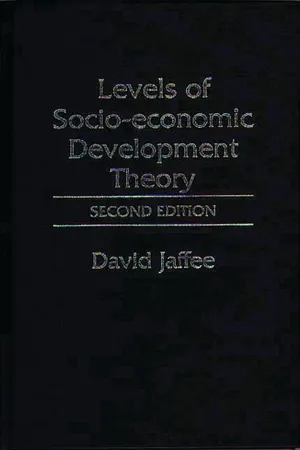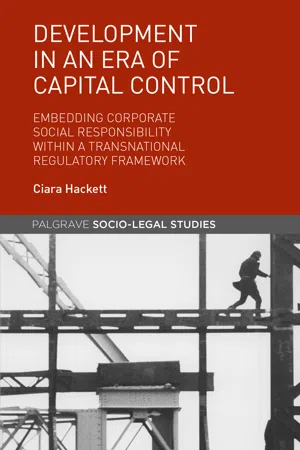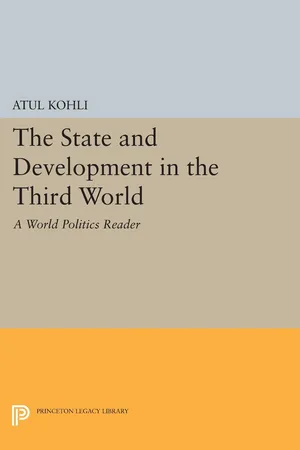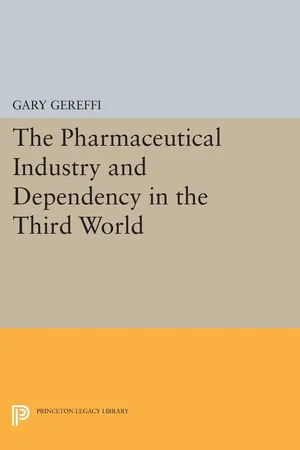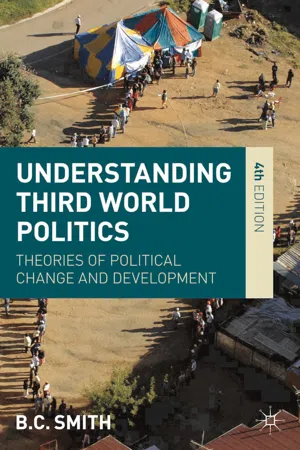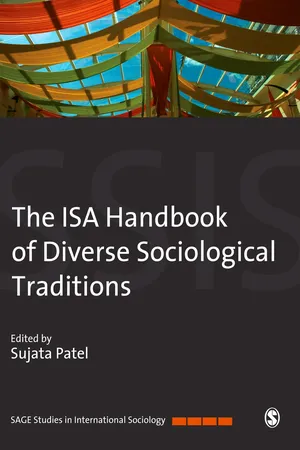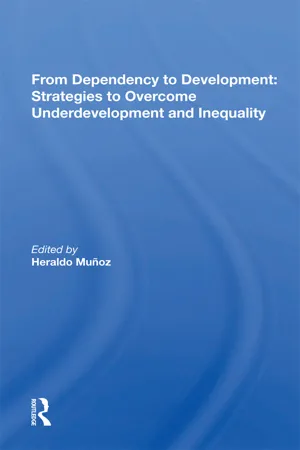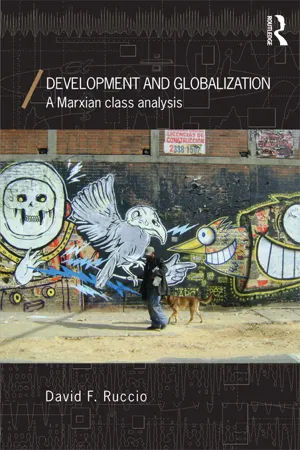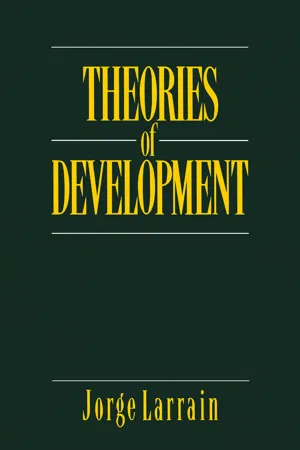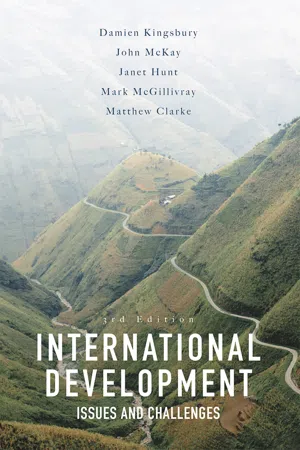Social Sciences
Dependency Theory
Dependency Theory is a perspective in social sciences that examines the relationship between developed and underdeveloped countries. It suggests that the economic development of underdeveloped nations is hindered by their dependence on and exploitation by more powerful, developed nations. This theory emphasizes the unequal distribution of power and resources in the global economy, often attributing underdevelopment to the historical and ongoing exploitation by more powerful nations.
Written by Perlego with AI-assistance
Related key terms
1 of 5
10 Key excerpts on "Dependency Theory"
- eBook - PDF
- David Jaffee(Author)
- 1998(Publication Date)
- Praeger(Publisher)
As we shall see, this theory (and there is some 152 Levels of Socio-economic Development Theory debate over whether it can be called a theory; see Lall 1975) contains a wide assortment of hypotheses and propositions advanced by a variety of theorists. There are, however, three basic premises that inform all versions of depend- ency/world-economy theory. First, the socio-economic structure and develop- ment of less-developed nations are best understood by examining the historical pattern of integration into, and interaction with, the capitalist world economy. Second, as the first premise implies, the theoretical framework must extend beyond the societal level of analysis and consider the role of broader world- economic structures and forces in shaping national development. Dependency/ world-economy theory emerged in reaction, and as an alternative, to sociological modernization and economic growth models that emphasized internal national, rather than external international, effects on development. Third, the global sys- tem, highly interconnected and interdependent, is characterized by an unequal distribution of power and influence. This results in some nations being more vulnerable, more dependent, and subjected to greater exploitation than others. Unequal and asymmetric interaction between rich and poor nations is a central theme in this model. The emphasis is on international relations within a world- economic system. The major explanatory variables in this model of social change are those that define the nature of international exchange and interaction. This chapter will review the arguments of some of the major theorists asso- ciated with dependency/world-economy theory. This is followed by a consid- eration of the emerging and mounting attacks on this thesis and some recent revisions. - eBook - PDF
Development in an Era of Capital Control
Embedding Corporate Social Responsibility within a Transnational Regulatory Framework
- Ciara Hackett(Author)
- 2017(Publication Date)
- Palgrave Macmillan(Publisher)
For the most part, assessments of develop- ment have been grounded in Western ideologies and, as such, skew both measurements and understandings of development. This book, however, portrays an alternative view on ‘development’ and is grounded in a Latin American theory, dependency that emerged after World War II. This chap- ter updates this theory of development somewhat and widens its applica- tion to explain the relationship between states and business. It challenges the parameters of the existing theory, specifically the key actors engaged 26 Development in an Era of Capital Control in unequal relationships, the interstate application and the emphasis on the market. Using this modified theory, this book offers an alterna- tive understanding of relationships within the global system and indeed our grasp of development. This has implications for the need, scope and appli- cation of CSR and more widely on the exchanges between government and business. 2.2 The context Dependency is a branch of development theory and is predicated on the idea that there exists a centre/core or metropole of wealthy ‘developed’ states and a periphery or satellite of poorer ‘underdeveloped’ states. In order to bolster economic growth in the core, resources are extracted from the periphery and channelled to the core to sustain growth. Of the various branches of development and in particular dependency theories, Frank’s (1967a, 1991) work on ‘underdevelopment’ through Dependency Theory coupled with Dos Santos’s (1970) ‘conditions of dependence’ approach are most useful as they provide a means to understand dependent relation- ships that can be adapted to shifts in the global order today (i.e. the rise of the MNC and the diminishing power of national governments). As such, much of the material used in this chapter can be traced to the 1960s and 1970s. - eBook - PDF
The State and Development in the Third World
A World Politics Reader
- Atul Kohli(Author)
- 2014(Publication Date)
- Princeton University Press(Publisher)
But, as its name implies, depend- ency theory's most distinctive point is its insistence that the logic of contemporary southern development can only be grasped by placing this process firmly within a globally defined historical context. That is, contemporary political and economic change in the South must be understood as aspects of imperialism today and yesterday. From this perspective alone—from the standpoint of local histories globally un- derstood—can the logic of the development process be comprehended correctly. As a result, dependency literature has emerged as a powerful ideo- logical vehicle joining southern nationalists and Marxists (together with their northern supporters) within the confines of a generally agreed-upon form of historical analysis. The importance of this union, whatever the tensions existing within it, should not be underestimated: Dependency Theory is not simply an academic exercise. For the most part, dependencistas are committed by their ideas to a form of political action (as they would maintain their developmentalist opponents in the United States to be, however much the latter might deny it). The literature stands out, therefore, because it is something more than a movement in the intellectual history of our day; it is an ideology as well—a form of discourse able to motivate significant political activity. That is, Dependency Theory represents far more than the intellectual association of Marxism and southern nationalism. It also represents an effort at the practical, concrete unification of two of the most im- portant historical forces of our century, with potentially significant consequences for both local and world history. This essay is an attempt to investigate what I believe to be a major historiographic failure of Dependency Theory. It is not intended to as- - Gary Gereffi(Author)
- 2017(Publication Date)
- Princeton University Press(Publisher)
13 For a discussion of the differences between "conventional" and "de- velopmental" history and their relation to the use of the comparative Dependency Theory Finally, modernization research has tended to be very mul- ftdisciplinary in nature. Scholars in economics, sociology, political science, psychology, and history have focused on specialized aspects of the modernization process in an uncon- nected fashion. The dependency perspective, on the other hand, has had from its beginnings a markedly interdisciplin- ary character that serves to integrate the social sciences in a comprehensive analysis of development (Cardoso and Fa- letto, 1969). In short, my preference for the dependency approach to development studies reflects my belief that the problems of underdevelopment in the third world can best be understood if one adopts a global rather than national framework for analysis, an open-ended rather than evolutionary view of his- tory, and an integrated and interdisciplinary rather than du- alistic and multidisciplinary conception of development. To say that Dependency Theory provides a better under- standing of current third world development problems than does modernization theory does not mean that the depend- ency perspective is without inconsistencies and possible anomalies of its own. The remainder of this chapter attempts to more fully elaborate the components of Dependency Theory and to provide the bases of a constructive critique. My discus- sion of recurring problems or inconsistencies in historical- structural studies of dependency will emphasize three main themes: 1) the issue of nondependency, 2) the political ques- tion of how, and under what conditions, various authors be- lieve that dependency can be overcome, and 3) the theoreti- cal eclecticism of dependency analysis.- eBook - PDF
Understanding Third World Politics
Theories of Political Change and Development
- Brian Smith(Author)
- 2013(Publication Date)
- Red Globe Press(Publisher)
56 Understanding Third World Politics The elements of Dependency Theory There are five main strands in Dependency Theory: the idea of a hierarchy of states, the concept of ‘underdevelopment’, a view about the nature of capitalism, propositions concerning ‘disarticulation’, and the effect of economic dependency of the structure of political power. Hierarchy finds its expression in ‘centre-periphery’ or ‘metropolitan-satellite’ models of relations between the great world centres of capital and the economies that are dependent upon them. A hierarchy of centres and peripheries connects all levels of exploitation between one country and another, and within the countries of the periphery. There is a steady extraction of surplus through the different levels in the hierarchy: from peasant to landlord; from landlord to local merchant; merchant to subsidiary of a multinational corporation (MNC); subsidiary to headquar-ters of the MNC; headquarters to the major financial institutions of the West. Mining, commercial, agricultural, and even military centres within the peripheral satellites constitute ‘micro-metropolises’ in relation to their hinterlands of small towns, mines, and latifundia which themselves relate in the same way to isolated workers. Similar relations of exploitation link industrial firms to the suppliers of components; large merchants and financiers to small traders and moneylenders; and city merchants and landowners to small rural producers and consumers (Frank, 1966 and 1969a). A satellite within this hierarchical structure will only experience devel-opment when its ties to the metropolis are weak: ‘no country which has been firmly tied to the metropolis as a satellite through incorporation into the world capitalist system has achieved the rank of an economically devel-oped country’ (Frank, 1969a, p. 11). - Sujata Patel(Author)
- 2009(Publication Date)
- SAGE Publications Ltd(Publisher)
By the end of the 1960s, dependence was the main topic of Latin American social sciences and Dependency Analysis had a brief inter-national circulation. However, success was more effective for some actors than for the theory itself. For roughly fifteen years, ‘Dependency Theory’ circulated widely within the field of Latin American sociology, in a limited way within the Caribbean, Europe, Africa and Asia, and only marginally within English speaking academies (Blomstrom and Hettne, 1990 [1984]). In the United States, it was mainly discussed in sociological environ-ments: (a) academic journals, such as Current Sociology ; (b) Latin American Studies’ publi-cations, such as Latin American Perspectives ; and (c) radical journals such as NACLA Newsletter (North American Congress Latin America), the Review of Radical Political Economics and Monthly Review . Within Europe the circulation of Dependency Theory was to a great extent due to its promotion by Dudley Seers at the Institute for Development Studies at the University of Sussex. In spite of Seers’ efforts, and the fact that some works were translated into English, the writings of Dependency remained available mainly in Spanish (Oteiza, 1978). Finally, dependentists found more rec-ognition rather than Dependency Analysis itself. These young sociologists were strug-gling to gain a place in the field, and they were able to replace the first generation of so-called ‘scientific sociology’. In the 1980s and 1990s, some of them were marginal-ized, along with the ‘defeat’ of Dependency. Others reconverted their academic capital into political credit: as a matter of fact, one of them became President of Brazil. In order to understand the constitution of the new intellectual and political elite in the region this issue has to be taken into consideration but the subject lies beyond the scope of this paper. NOTES 1. I wish to thank Sujata Patel and Verónica Perera for their valuable comments on this paper.- Heraldo Munoz(Author)
- 2019(Publication Date)
- Routledge(Publisher)
36It is important to stress that the process can be understood only by reference to its historical dimension and by focusing on the total network of social relations as they evolve in different contexts over time. For this reason dependence is characterized as "structural, historical and totalizing" or an "integral analysis of development."37 It is meaningless to develop, as some social scientists have, a series of synchronic statistical indicators to establish relative levels of dependence or independence among different national units to test the "validity" of the model.38 The unequal development of the world goes back to the sixteenth century with the formation of a capitalist world economy in which some countries in the center were able to specialize in industrial production of manufactured goods because the peripheral areas of the world which they colonized provided the necessary primary goods, agricultural and mineral, for consumption in the center. Contrary to some assumptions in economic theory the international division of labor did not lead to parallel development through comparative advantage. The center states gained at the expense of the periphery. But, just as significantly, the different functions of center and peripheral societies had a profound effect on the evolution of internal social and political structures. Those which evolved in the periphery reinforced economies with a narrow range of primary exports. The interdependent nature of the world capitalist system and the qualitative transformations in that system over time make it inconceivable to think that individual nations on the periphery could somehow replicate the evolutionary experience of the now developed nations.39- eBook - ePub
Development and Globalization
A Marxian Class Analysis
- David F Ruccio(Author)
- 2012(Publication Date)
- Routledge(Publisher)
This model employs certain theoretical concepts and posits the existence of certain entities or processes. The concepts are theoretical in the sense that their full meaning can only be grasped in the context of their role in the theoretical model. The posited entities or processes are theoretical in a somewhat different sense. First, their natures can be explained fully only in relation to the model and the theoretical concepts it uses. Second, they cannot be perceived or picked out independently of the theoretical model. They are observable, that is, only through the “lens” of the model. At the same time, the explanatory acceptability of the theoretical model depends, at least in part, on the acceptability of the theoretical concepts. As we shall see below, much of the critical reaction to Frank and, indeed, much of the debate concerning Dependency Theory, revolves around the acceptability of various theoretical concepts and their utilization in explanations of development. The key concept in this model is dependency, hence “Dependency Theory.” This concept is used to pick out and characterize the object of study, namely, the present condition of developing nations. That is, an initial distinction is assumed between developed and developing countries. What are initially identified as developing countries are supposedly selected through a comparison with the developed countries in terms of certain indices, for instance, an index of wealth, both as to its level and distribution. 9 The so-called developing nations, Frank then suggests, are better considered as under developed rather than un developed in order to distinguish states of development historically produced from those that can be considered in some sense “original” conditions. These underdeveloped nations are then characterized as participating in a relation of dependency. It is because of their dependency relationship, which is to be elaborated in the model, that these countries are underdeveloped - eBook - ePub
Theories of Development
Capitalism, Colonialism and Dependency
- Jorge Larrain(Author)
- 2013(Publication Date)
- Polity(Publisher)
Therefore, I would like to propose a more general classification which will, nevertheless, keep Palma’s distinctions but on a different basis. The criterion of distinction is the conception of capitalism. On the one hand, we have a group of theories which emphasize two aspects: first, capitalism is conceived as a world system characterized by an inherent duality, a centre–periphery dichotomy which determines two radically different developmental potentialities; and second, these differential potentialities are caused by transfers of resources through mechanisms of unequal exchange in the international market. This means that some countries develop because others underdevelop, and that the latter underdevelop because the former develop. Here we can locate Frank’s theory which is genuinely dependentist, but also Wallerstein’s world system approach, and Emmanuel’s and Amin’s unequal exchange theories.On the other hand, we have a second group of approaches which, although accepting the conditioning influence of the capitalist world system, focus on capitalism as a mode of production or as an economic system which must be specifically and historically analysed within concrete social formations and national boundaries. They tend not to emphasize international market relations and transfer of resources through trade as the decisive basis of exploitation but look instead into the internal relations of production and class conflicts as the crucial elements which determine how external influences operate and are internally redefined. Here one can locate Palma’s two last strands plus Hinkelammert’s theory as three different versions.First, the structuralists like Pinto, Sunkel and Furtado emphasize the obstacles to national development and adhere to a rather humanitarian and moral conception which distinguishes a genuine process of development from a mere process of economic growth. Second, Hinkelammert’s theory of unbalanced peripheries rejects the confusion of peripheral situations with situations of underdevelopment and emphasizes technological dependence by drawing on Marxism and theories of economic space. Third, the Marxist-inspired approach of Cardoso and Faletto distinguishes concrete situations of dependency and various historical phases of it which depend on the integrated analysis of international conjunctures and internal class struggles of particular dependent countries or groups of countries. For these authors, dependency and development are not incompatible and can go together in a process which they call ‘associated dependent development’. - eBook - PDF
International Development
Issues and Challenges
- Damien Kingsbury, John McKay, Janet Hunt(Authors)
- 2016(Publication Date)
- Red Globe Press(Publisher)
Growth may occur by concentrating on the development of infrastructure, thereby reducing production costs and encouraging further investment in production, or the reverse may be preferred. If production is privileged, inefficiencies in infrastructure will appear, forcing catch-up investment. Either strategy might work, and the choice of the more appropriate would depend on local circum-stances. The work of Hirschman and Myrdal grew out of the tradi-tion of modernization studies, and used some of the same theoretical assumptions, but their attention to the persistence of inequalities pro-vides a direct link to some of the more radical critiques that began to appear in the 1960s. The challenge of Dependency Theory During the 1960s it became clear that inequalities were not being nar-rowed as conventional economic theory had predicted: rather, the world was becoming increasingly divided between the powerful core regions and the impoverished periphery. In Myrdal’s terms, the spread effects were being overwhelmed by the much more powerful forces of backwash. One of the regions where this reality was most pronounced was in Latin America, and it was from here that an influential set of new theories began to emerge – what became known as the dependen-cia or dependency school. Much of the initial impetus for this mode of thought came from the work of the United Nations Economic Commission for Latin America, and in particular from the work of Raul Prebisch. The central argument – now known as the ‘Prebisch thesis’– was that the basic assumptions of neoclassical economics did not exist in the real world: the economic landscape did not primarily consist of small producers and buyers, each operating in a perfect marketplace with none able to exert power over these market processes. Rather, global commerce took place between the rich and powerful developed economies and the weaker periph-eral countries. Not surprisingly, the rules of the trading system were
Index pages curate the most relevant extracts from our library of academic textbooks. They’ve been created using an in-house natural language model (NLM), each adding context and meaning to key research topics.
